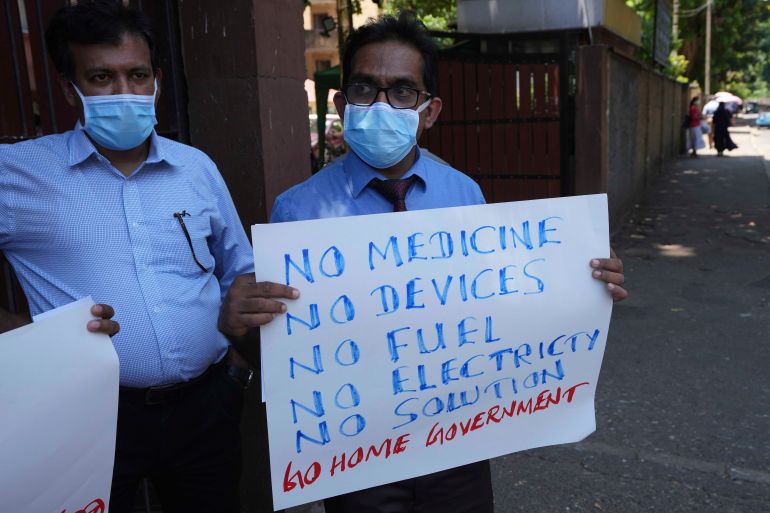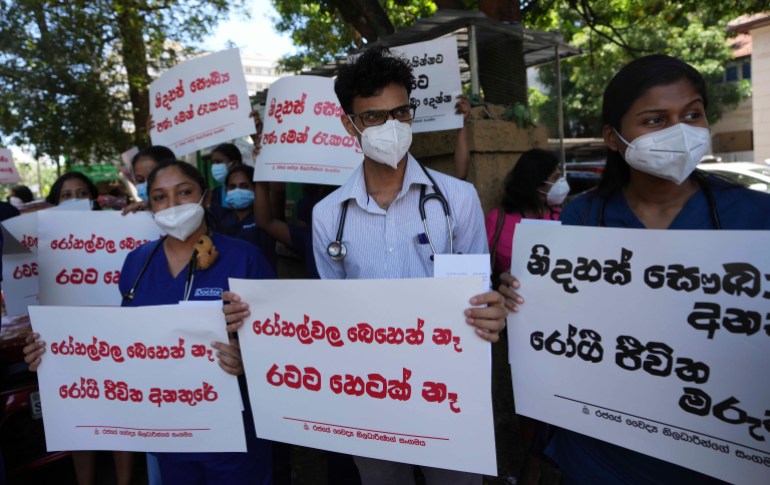‘Death sentence’: Doctors in Sri Lanka decry medicine shortage
As essential medications disappear from shelves, doctors are forced to postpone life-saving procedures amid unprecedented economic crisis.

A shortage of medicine caused by an economic crisis in Sri Lanka could soon cause deaths, doctors say, as hospitals are forced to postpone life-saving procedures for their patients because they do not have the necessary drugs.
Sri Lanka imports more than 80 percent of its medical supplies but with foreign currency reserves running out because of the crisis, essential medications are disappearing from shelves and the healthcare system is close to collapse.
Keep reading
list of 4 itemsSri Lanka bank says fuel shortage set to ease as students protest
Sri Lanka slips into default, central bank head agrees to stay on
Sri Lanka minister asks people not to queue for fuel for two days
At the 950-bed Apeksha cancer hospital on the outskirts of the commercial capital, Colombo, patients, their loved ones and doctors feel increasingly helpless in the face of the shortages that are forcing the suspension of tests and postponement of procedures, including critical surgery.
“It is very bad for cancer patients,” said Dr Roshan Amaratunga. “Sometimes, in the morning we plan for some surgeries (but) we may not be able to do on that particular day … as [supplies] are not there.”
If the situation does not improve quickly, several patients will be facing a virtual death sentence, he said.
Sri Lanka is grappling with its worst economic crisis since independence in 1948, brought about by COVID-19 battering the tourism-reliant economy, rising oil prices, populist tax cuts and a ban on the import of chemical fertilisers, which devastated agriculture.
‘They will lose their lives’
A government official working on procuring medical supplies said about 180 items were running out, including injections for dialysis patients, medicine for patients who have undergone transplants and certain cancer drugs.
The official, Saman Rathnayake, said India, Japan and multilateral donors were helping to provide supplies, but it could take up to four months for items to arrive.
In the meantime, Sri Lanka has called on private donors, both at home and abroad, for help, he said.

Doctors say they are more worried than the patients or their relatives, as they are aware of the potential size of the problem and its impact on the wider population.
Referring to the ubiquitous queues for petrol and cooking gas, Dr Vasan Ratnasingam, a spokesman for the Government Medical Officers’ Association, said the consequences for people awaiting treatment were so much more dire.
“If patients are in a queue for drugs, they will lose their lives,” said Ratnasingam.
The mother of Binuli Bimsara, a four-year-old girl being treated for leukaemia, said she and her husband were terrified.
“Earlier, we had at least some hope because we had the medication but now we are living under tremendous fear,” the mother said.
“We are really helpless, our future is really dark when we hear about a shortage of medicines. We don’t have money to take our child abroad for treatment.”
Indian authorities delivered 25 tonnes of medical supplies, along with other aid, on Sunday, officials said.
“At no time has India assisted any other country to this extent … This is something for which we are deeply grateful,” Sri Lanka’s foreign minister G L Peiris said at Colombo’s port as he stood by a vessel bringing in thousands of packages of supplies.
“This is probably the most difficult period that Sri Lanka has had to face since independence.”
India sends food, medicine
Meanwhile, Sri Lanka has received a first consignment of humanitarian aid from neighbouring India to help mitigate severe shortages of food and medicines.
Gopal Baglay, the Indian envoy to Sri Lanka, delivered the donation from the southern Indian state of Tamil Nadu to Sri Lanka’s Foreign Minister Gamini Peiris late on Sunday.
The goods, worth $5.6m, include rice, milk power and essential medicines. They will be distributed among vulnerable families in different parts of the country, the Indian embassy said in a statement.
For the past few months, Sri Lankans have been forced to stay in long lines to buy the limited stocks of food, fuel, medicines and cooking gas as the island nears bankruptcy.
The country’s new prime minister said last week that petrol stocks ran down to a final day, worsening commuting problems and lengthening lines. But shipments of gasoline paid through an Indian credit line started arriving over the weekend.
Sri Lanka has suspended repayment of about $7bn in foreign loans due this year out of $25bn to be repaid by 2026. The country’s total foreign debt is $51bn.
Separately, India has provided a $3.5bn economic assistance in the form of loans and buyers’ credit for food, medicine and fuel.
Sri Lanka’s economic crisis has created political unrest with a 40-day protest occupying the entrance to the president’s office, demanding his resignation and the Rajapaksa clan to leave politics.